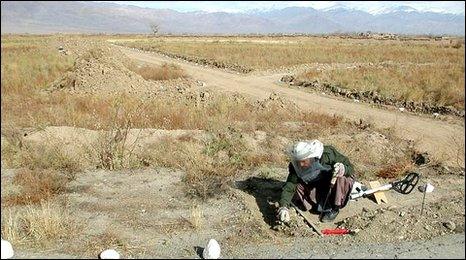Lasers could 'sense' vapours released by explosives
- Published

Scientists believe robots might soon replace people in the search for landmines
UK scientists claim to have developed laser technology able to sense hidden explosives.
The technology could help to detect landmines and roadside bombs and to improve airport security.
The team from University of St Andrews produced a laser by "pumping" a type of plastic called polyfluorene with photons from another light source.
They found the laser reacted with vapours from explosives such as TNT.
The work was published in the journal Advanced Functional Materials.
Graham Turnbull, a physicist at the University of St Andrew's in Fife, UK, is one of the authors of the study.
He explained that the researchers created a mechanism able to sense TNT-like molecules frequently used in explosives at extremely low concentrations - less than 10 parts per billion.
"Floating above a landmine in Iraq or Afghanistan, there's a very weak, dilute cloud of vapours of explosive molecules that the bomb is made from," said the Dr Turnbull.
"A small number of these TNT-like molecules comes into contact with a plastic film that the laser is (produced) from, interacts with the light-emitting molecules in the laser and switches off the light emission."
The scientist explained that this interaction of TNT-like molecules with the polymer chain provides a totally new way to stop the laser from working.
Ifor Samuel, Dr Turnbull's colleague and a co-athor of the study, said that once developed, such mechanisms could sense any kind of explosive device - including roadside bombs - a major issue in Iraq and Afghanistan.
"This technology is important because polymer lasers, since they're made of plastic, could be made very easily and because it's a very new property for a laser to have," he said.
The plastic laser approach could detect lower concentrations of explosive
This sort of technique has been looked at in the past. But this is the first time researchers have used a polyfluorene plastic laser, said Dr Turnbull.
This allows the detection of much lower concentrations of explosive vapours, he added.
The scientist believes that one of the ways to use this type of laser would be to have it on a robotic, perhaps remotely controlled, vehicle that would be able to "sniff around" in a mine field, looking for vapour clouds.
"On a dusty road in Afghanistan there are relatively few things that might give you a false positive and it certainly could have potential in that area. Essentially it's making an artificial nose for a robot dog," said Dr Turnbull.
He also suggested using the system as a means to improve airport security, to detect explosive vapours coming from people's luggage.
One of the selling points of plastic lasers is that they're expected to be relatively low cost, as polyfluorene is widely available, added the scientist.
- Published28 May 2010